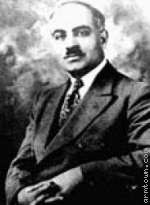guardian.co.uk,
Thursday June 12 2008
1952-
"When my sales went up my welcome from the Turkish literary scene disappeared"
Birthplace
Istanbul, Turkey
Education
From an American school in Istanbul Pamuk went on to study architecture at Istanbul Technical University for three years. He then enrolled on a journalism course at Istanbul University in order to put off his military service.
Other jobs
Although Pamuk's family did not approve of his decision to abandon his architectural studies in order to become a full-time writer, his father did support him with 'pocket money' until he was 32. He also spent three years as a visiting scholar in Iowa.
Did you know?
In 1998 Pamuk refused to accept the prestigious title of "state artist" from the Turkish government. He said that if he accepted it he could not "look in the face of people I care about".
Critical verdict
Although Pamuk started writing full-time in the mid 1970s, he did not achieve popular success until the 1990s - and then he swiftly became the fastest-selling author in Turkish history. He is unusual in achieving both mass market success and critical acclaim for his complex, post-modern novels which tackle big themes - cultural change, identity crises, east v west, tradition v modernity - head-on. International recognition of his work came more recently, with the Irish Impac award in 2003, followed by the German book trade Peace prize and the French Prix Médicis étranger. He was also widely believed to have been a serious contender for the 2005 Nobel prize for literature, which went to Harold Pinter. However, it is for his political travails that Pamuk's name is becoming best known outside his home country. Following remarks made during an interview with a Swiss magazine in February 2005 concerning the alleged genocide of Kurds and Armenians in Anatolia between 1915 and 1917, he was charged by Turkish state prosecutors with "insulting Turkishness" - a new offence which carries a prison sentence of up to three years as a penalty. Pamuk's trial opened on December 16 2005 and was immediately rescheduled for February 7 2006. Tensions over the case in Turkey are running high - Pamuk has said that he was initially forced to flee the country because of a hate campaign being waged against him - but there has also been an international outcry, with Amnesty International, PEN (the worldwide association of writers) and a collection of renowned authors (including Gabriel García Márquez, John Updike, Gunter Grass and Umbert Eco) denouncing Turkey's actions.
Recommended works
Pamuk is best known outside his own country for his two most recent novels - My Name is Red (2000) and Snow (2002, English translation 2004). The former, which won the Impac award, is a murder mystery and love story set among the artistic intrigues of the Islamic miniaturists of the Ottoman court in 16th-century Istanbul. A rich and complex work narrated by a range of voices, it explores the tension between east and west, Islam and Christianity. The critically-acclaimed Snow, a thriller set in the 1990s that features a poet who is caught up in a military coup, is the first of Pamuk's novels to tackle politics directly. While either of these would be a reasonable introduction to Pamuk's style and primary concerns, new readers may be better advised to start off with The White Castle (1985). An allegory of two doppelgangers, it is his shortest and arguably most accessible work, but its focus on identity-swapping introduces a key theme of Pamuk's work. Meanwhile, there is no better introduction to Pamuk's own background than Istanbul: Memories and the City, the writer's love letter to the city of his childhood and memoir of his early life.
Influences
Pamuk acknowledges the influence of Dante on his novel The New Life and Joyce's Ulysses on The Black Book. John Updike has compared Pamuk's intellect and descriptive skill to Proust, but writers more commonly cited as the progenitors of Pamuk's style of postmodern narrative trickery are Kafka, Jorge Luis Borges, Italo Calvino, Garcia Márquez and Salman Rushdie.
Now read on
Staying within Turkey, another well-known writer-in-translation is Yasar Kamal. Try his Mehmet, My Hawk, the story of a boy growing up in Anatolia. For background on the country, Lords of the Horizon: a History of the Ottoman Empire by Jason Goodwin is worth a dip. The same author has a novel due out, too - The Janissary Tree is described as a detective thriller set in 19th-century Istanbul. Ranging more widely on the fiction front, Panos Karnezis's tale of a dissolute Greek army brigade making their way across the Anatolian desert, The Maze, may appeal, as may his short story collection, Little Infamies. Umberto Eco would, of course, be a safe choice. Readers who are attracted by Pamuk's political stance may like to explore the poetry of the late Nazim Hikmet, who brought modernism to Turkish literature but was stripped of his Turkish nationality in 1959 for criticising the political system.
Adaptations
In 1992 Pamuk wrote the screenplay for a film, Gizli Yuz, which was derived from his novel Kara Kitap (published in 1990, translated as The Black Book in 1995).
Useful links
Background
·Comprehensive website
· Wikipedia entry on Pamuk
· Pamuk's Impac award citation
· Pamuk on Istanbul
· Pamuk's letter to The New Yorker on the subject of his trial
http://www.guardian.co.uk/books/2008/jun/12/orhanpamuk
Friday, August 1, 2008
Subscribe to:
Post Comments (Atom)

No comments:
Post a Comment